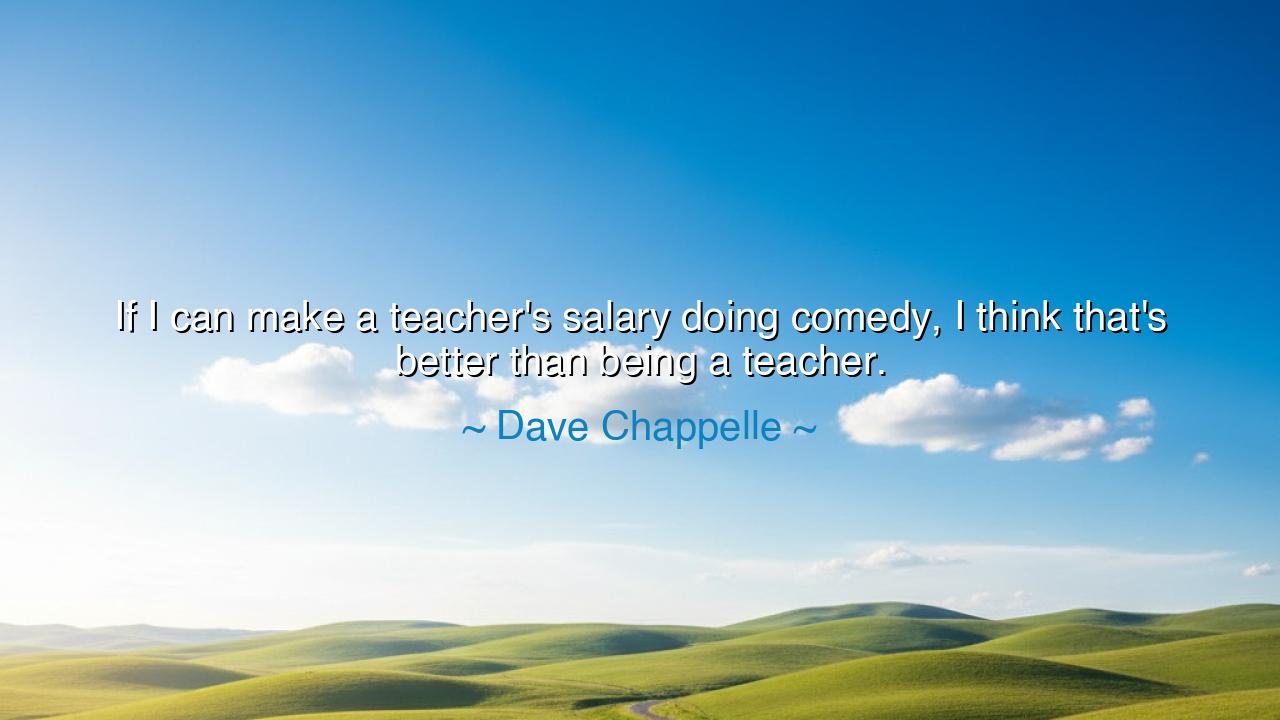
If I can make a teacher's salary doing comedy, I think that's
If I can make a teacher's salary doing comedy, I think that's better than being a teacher.






Hearken, children of the ages, to the words of Dave Chappelle, who once proclaimed: "If I can make a teacher's salary doing comedy, I think that's better than being a teacher." In this declaration lies a contemplation upon the value of labor, the pursuit of joy, and the reconciliation of practical sustenance with personal passion. Though some may hear a jest in his tone, the truth beneath is profound: it speaks to the eternal human quest to balance vocation and livelihood, service and freedom, duty and delight.
The essence of Chappelle’s reflection rests in the recognition of the weight of teaching. To be a teacher is to bear a sacred mantle: to illuminate minds, to shape character, to labor in silence and hope that seeds sown today bloom in the hearts of tomorrow. Yet the world often undervalues this sacred labor, for the salary of the teacher rarely mirrors the immeasurable importance of the work. Chappelle, in juxtaposing this reality with his own calling, draws attention to the discord between societal valuation and human contribution, a dilemma as old as civilization itself.
And yet, in this tension arises the notion of choice. Chappelle did not dismiss the teacher; he merely observed that if one could sustain oneself while pursuing joy, creativity, and mastery in another field, perhaps that path aligns more closely with personal flourishing. In the ancient epics, we find echoes of this tension: the poet who left the farm to wander, the philosopher who forsook inheritance to seek wisdom. Life demands courage, for it is not enough to toil; one must also seek the work that resonates with the soul.
Consider the tale of Mark Twain, who once labored as a printer and riverboat pilot, jobs of steady work and modest reward. Yet when he pursued the art of writing, the world laughed with him and sometimes at him, but his voice, his truth, and his wit brought both sustenance and legacy. Twain’s journey mirrors Chappelle’s musing: to align one’s earnings with passion is not mere luxury, but a practical wisdom, for life is too brief to serve only the needs of survival when the heart longs to create, to entertain, to awaken minds.
Still, Chappelle’s words provoke contemplation of the moral and societal dimensions of work. To seek personal fulfillment, even when it rivals the service of others, is a human prerogative—but the question arises: does this choice diminish the sacred value of the teacher? The ancients remind us that every profession carries honor when performed with integrity, diligence, and heart. Chappelle’s jest is thus also a subtle admonition: pursue your path with both wisdom and humility, for each labor contributes to the fabric of society, whether it shapes minds in a classroom or shapes hearts through laughter.
From this reflection emerges a lesson of pragmatic aspiration: evaluate not only the monetary worth of your labor but also the satisfaction, creativity, and meaning it brings. Seek to balance the sacred duty of contributing to the world with the personal imperative of living a life that resonates with your talents and passions. The lives of countless inventors, artists, and thinkers illustrate this: to follow the path that nourishes the soul often yields both practical reward and lasting impact.
And so, hear this teaching: if your hands can shape joy, if your words can awaken laughter, if your spirit can soar in pursuit of craft, then honor that calling. Yet do so with gratitude for those who labor unseen in roles of quiet heroism, for the teacher molds the foundations upon which all other endeavors stand. Chappelle’s insight is a call to balance, to courage, and to discernment: find the path where your gifts meet sustenance, and let your life be both joyful and consequential.
In the echo of Chappelle’s words, let future generations remember: work is not merely toil; it is the stage upon which the human spirit dances. To pursue your passion while sustaining yourself is a triumph, yet never forget the sacredness of those who labor for others in ways that may never be fully measured. Let the listener take heart, align their talents with purpose, and step boldly into the path where satisfaction, creativity, and responsibility converge, for in this convergence lies the wisdom of living well.






AAdministratorAdministrator
Welcome, honored guests. Please leave a comment, we will respond soon